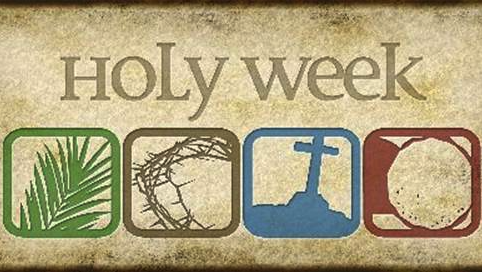How to Survive Holy Week: 7 Tips for Church Musicians

Holy Week is one of the most beautiful, meaningful and exhausting weeks in the entire church year.
From Palm Sunday through Easter, it’s a marathon of liturgies, rehearsals, psalms and even last-minute changes.
Even the most seasoned choir directors and singers can feel overwhelmed by it all
To be successful for our congregation, we have to be on our "A" game by being practical and strategic
Before we get started, I always offer a huge discount on my training courses this week only. Here are the links if these courses might help you out:
How to Sight Read Music (60% off, no code needed)
Choir Essentials for Choir Directors (50% off with code HappyEaster)
Advanced Vocal Technique for Singers (50% off with code HappyEaster)
Fearless Voice Training (50% off with code HappyEaster)
How to Conduct Course (25% off, no code needed)
********Let’s get started********

1) Become a nerve-less leader
Nervous energy has a nasty way of reinforcing itself
It usually goes like this:
A person gets nervous, they fixate on the nerves which causes them to make mistakes which causes them to get MORE nervous and make others nervous!
This flywheel affect can go on steroids when you’re dealing with groups of people
A nervous group can create a big ball of nervous energy and easily destroy a rehearsal or special musical moments
At these times, we need calm leaders to step up!
When your peers or groups get nervous or jittery, it’s your job to go in the opposite direction
Become way more grounded than them – start cracking jokes like “Good thing we have 4 weeks to fix this” or "Don't worry, God still loves you" :)

And when you personally get nervous, take a moment to breath deeply into your lungs through your nose, hold for 3 seconds, and release out your mouth
These strategies are proven to help you calm yourself and others down for the best performance
2) Mark Your Scores
It sounds simple, but cleverly marking your music can massively help you
Look through the liturgy and think about what is most likely to go wrong here on my part?
Then, put in markings that will help you get through that moment
*Example 1: You’re worried about skipping lines in the psalm
Possible Markings: Underline/highlight verse 3 so that your eyes can more easily see where they are
*Example 2: You’re worried about jumping all the way back to the refrain on the Gloria
Possible Markings: Put a paperclip or dog-ear the top of the refrain page. Write REFRAIN in large letters so it’s harder to get lost
*Example 3: You’re worried about a difficult transition ahead, but you can usually get it with focus
Possible Markings: draw a pair of eyeglasses about 4 bars before the transition – this is my personal marking which means “pay attention, something tricky is coming!”

*Example 4: You’re worried about a long or high vocal passage
Possible Markings: Write “breath support” or “have courage!” into your music
These simple markings can make a huge difference in the heat of the moment
3) Planning is King
Your planning is essential to success
For us as individuals, our music should be in order or easily accessible
For working with groups, we have to give them tools so they feel and are planned out
For your choir, this may look like an individual sheet with ALL of the music selections, rehearsal and Mass times for the day or week
You should also think through any transitions – such as how the choir is going to process to the Altar of Repose, or sing their parts in the dark!
Take a few minutes to think through how things should play out, and then make adjustments or give instructions to set them up for success
4) Isolate Difficult Parts
In the 1-3 days leading up to a big ‘performance’, I will continue to isolate the difficult parts in my practice
It doesn’t matter if that’s a vocal passage, organ passage or conducting moment
Find the places that worry you the most, and go through them several times slowly first, then speeding up
When you finally perform the work, that moment will be much healthier because of your dedicated practice!
5) Perfection isn’t the goal
Don’t forget, your role as a music minister is to bring the people closer to God by ‘performing’ the liturgy to the best of your ability
In this way, we are a middle-person in what is actually happening
Our only job is to be our best so that people can grow closer to God through our music
When mistakes happen, which they will, we are reminded that perfection isn’t the goal…
But rather, an honest performance, even with mistakes, will win every time in the goal of bringing people closer to the Lord
6) Holy Week is a Marathon, not a Sprint

When you are faced with a series of liturgies/rehearsals/meetings, remember that you are running a marathon and not a sprint
With that, it is key to pace yourself for the long haul
It can be tempting to skimp on the basics, but this is NOT the time to take shortcuts
So, do all of the good stuff: get as much sleep as possible, pray to God for a smooth liturgy, tune out mentally when you can take a break, go for a walk and eat healthy
7) Invest in your Skill Set
When nerves, exhaustion and overstimulation hit, we will always fall back to our skill set.
I have found that the most accomplished musicians become the least nervous because they have built a skill set which carries them through
On the contrary, those trying to do too many new things at once can find themselves reverting to old ways in the heat of the moment
Once this week is over, take time during the Easter season or summer to improve your skill set
Whether that be sight reading, vocal technique, solving stage fright, conducting or choral direction, your skill set is the most important asset you have going into Holy Week (other than God's grace)
This is why we invest in our skills – so that every area of our ministry produces the most fruit possible
---
I wish you all a Blessed Holy Week! May it go smoothly for you and your congregation
Best,
Dr. Mike from Music Ministry 101

